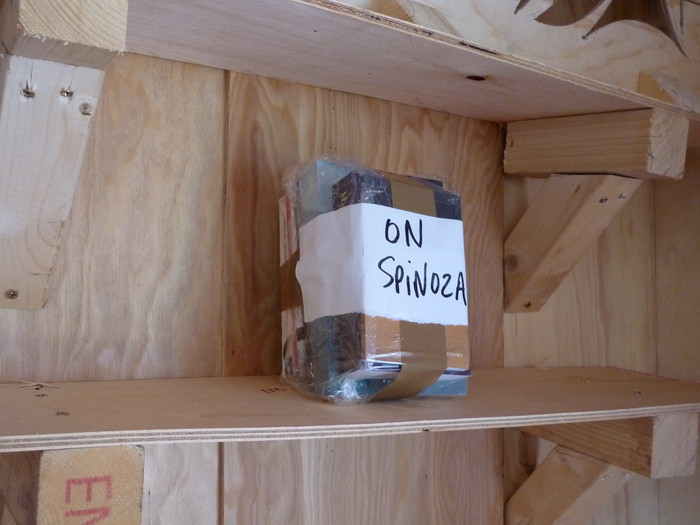THINKING THE UNTHINKABLE: THINKING TRUTH 3RD LECTURE AT THE BIJLMER SPINOZA-FESTIVAL: MAY 4, 2009 BY MARCUS STEINWEG (ABSTRACT)

THE BIJLMER SPINOZA-FESTIVAL
AN ARTWORK BY THOMAS HIRSCHHORN
http://www.thebijlmerspinozafestival.nl/_home/home.html
AN ARTWORK BY THOMAS HIRSCHHORN
http://www.thebijlmerspinozafestival.nl/_home/home.html
As opposed to the Thomist concept of truth that reduces truth to propositional logic, and as opposed to Heidegger's concept of truth that determines human existence as an existence understanding being, as being-in-the-world, I want to propose a third concept of truth. In his critical engagement with Descartes (who, in a classical, almost Platonic separation of the subject's body from its status as ego cogito, as thinking ego, proceeds from a dualistic metaphysics), Heidegger answered the Cartesian dilemma, "How do I get the cogito out into the world?" in the following way: "I do not have to get it out at all because it is already out there". The human cogito is original ecstasy, originary transcendence to the dimension of the world, as Heidegger calls it, the world or also the openness of being-in-the-world. The only point where I have trouble with Heidegger here is that the determination of human being as being-in-the-world implies a privileging of this relationship insofar as the human subject, human existence as being-in-the-world, is almost seamlessly embedded in its world. According to Heidegger, being-in-the-world is the fundamental structure of human existence. As originary being-in-the-world, human existence, or Dasein, is at home in the world, no matter how much Heidegger also speaks of not being at home and of unhomeliness (no matter how much he also concedes that being at home is derivative of being not at home ). Ultimately, the analysis of Dasein privileges the character of familiarity as opposed to the eery mode of unhomeliness in the world, since the world is Dasein's sphere of openness in which it moves as if in its element. Even though truth as disclosedness reaches back into hiddenness, even though being is thought as withdrawal, Heidegger insists on a vocabulary of one's own and of one's own authenticity that promises Dasein a kind of ontological home. Against this ontology of home, I want to define truth as the limit of the universe of facts, as the limit of that which Heidegger calls the world, the limit of this interconnection of usefulness in which Dasein articulates its self-evident relations to the world and to itself within the life-world. I call truth that which cannot be positivized any further, which does not allow any kind of positivity in the space of constituted realities, in the dimension of facts. One could also say, putting a point on it: truth is that which does not exist.
